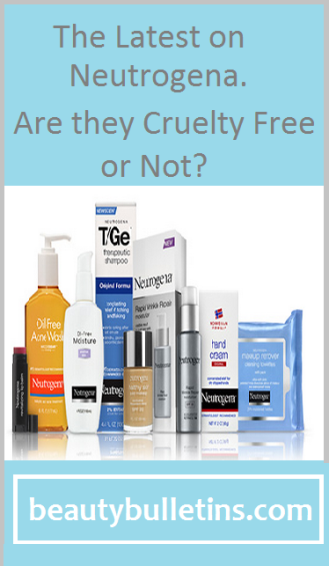The Latest on Neutrogena. Are they Cruelty Free or Not?
Neutrogena is well known for its skincare commercials, both in print and on television, that feature various spokesmodels like Jennifer Garner, Nicole Kidman & Diane Lane.
Who Owns Neutrogena?
Johnson & Johnson agreed in 1994 to pay $924 million for the Neutrogena Corporation, giving the big health care and consumer products company a strong mass-market brand for its expanding skin and hair care business.

The purchase also gave Johnson & Johnson a broader base on which to build its consumer skin care business. The company in 1991 bought Revlon’s Clean and Clear line, aimed at teen-agers; in 1993, it purchased Roc S.A., & owns Aveeno, Purpose and Lubriderm.
Johnson & Johnson’s website for the company’s animal testing policy: “At Johnson & Johnson, it is our policy is to minimize the use of animals in laboratory research when assessing the safety and efficacy of our products. However, the use of animals in the development of our products is sometimes required to ensure products are safe and effective. Due to the fact the company commissioned tests on animals for its products it received Ethical Consumer’s worst rating for its animal testing policy.
Neutrogena also sells in countries that require animal testing.
2005 Resolution: Give the Animals 5
With the help of PETA supporters who held stock in J&J, a resolution was filed in the fall of 2004 calling on the company to “Give the Animals 5“—replace five crude and cruel tests on animals with state-of-the-art and scientifically valid non-animal methods that were already in use in other countries.
J&J opposed PETA’s resolution and sought permission from the Securities and Exchange Commission (SEC) to exclude our resolution from its proxy statement. Fortunately, the SEC staff ruled in PETA’s favor and did not concur with the company’s position.
Supporting animal testing in India
The ‘Action centre’ section of the Peta website www.peta.org.uk/action/ listed the organisation’s current campaigns. One post viewed on the 22nd of September 2014 reported that although India had made great progress in ending cruel experiments on animals after its ban on testing cosmetics on animals, the ban on imported animal-tested cosmetics into the country and the removal of animal tests for cosmetics and household products (such as cleaners and detergents) from the relevant standards by the Bureau of Indian Standards. But the Indian Beauty & Hygiene Association (IBHA) and its small group of members – which included largely foreign brands such as Johnson & Johnson – had actively opposed this life-saving progress. PETA stated that “If the IBHA succeeds in weakening or reversing India’s existing ban on animal testing for cosmetics or in impeding its progress on ending the import of cosmetics that have been tested on animals, products could continue to be sold in India which have been tested by dripping harsh chemicals into rabbits’ eyes, smearing them onto animals’ abraded skin or forcing them down animals’ throats. Or worse, animal testing could be permitted in India again.”
PETA communication:Urge These International Companies to Stop Supporting Animal Tests in India (September 2014)






